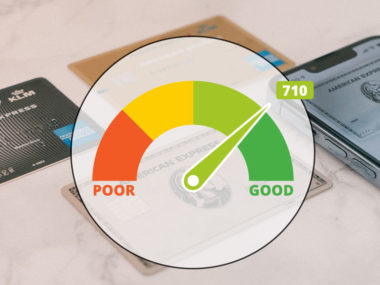
When discussing the finances of your business, the first thing that might come to mind is paying rent, stocking inventory, or payroll. Tracking sales, orders, and your employees is hard enough; no wonder accountants are always in high demand!
The “back-office” part of your business is already so full of paperwork and receipts. How can you possibly have the time to dive into your business’ credit standing? As it turns out, your business’ credit score is considerably more important than you might imagine. Not only are potential loans and credit cards on the line when you have a low score, but so are potential opportunities to build your business.
However, understanding your business credit score doesn’t require a degree in rocket science (or even accounting for that matter). All it requires is some knowledge of how it works, how it affects your personal score, and where to find it.
Table of Contents
The Score Numbers
Unlike your personal score — which ranges anywhere from 250 to 900 — your business’ credit score is on a scale of 0 to 100, or 0 to 300; depending on the credit union. Why is there no standardization of your number? Because every credit bureau researches your business’ score in a different way. And — unlike your personal score, which measures credit history — your business score is measured on credit “worthiness” or how much your business deserves a loan and how likely you are to pay it back.
The most common business credit bureau is Dun & Bradstreet (D&B), but Equifax, Experian, and FICO all offer a business score as well. The D&B score is on a scale of 0-100, with 75 or above being an ideal number. However, to receive a business credit score you must first be a part of the D&B network. It’s free to sign up, and is the most popular bureau to both businesses and banks.
Once you are signed up you will have what is known as a DUNS number, and it will work as an identifier for anyone that wants to pull your business’ credit report from D&B. Requesting a credit report from any of the three major bureaus for your personal business does cost some money, but isn’t an exceptional amount. Check out their individual websites for prices: Equifax, Experian, and Dun & Bradstreet.
The FICO score for businesses also measures your business’ likelihood of repayment, but has a different scale: 0-300. This score is known as the FICO LiquidCredit Small Business Scoring Service (FICO SBSS), and is used heavily by the Small Business Association in determining a small business’ chances of obtaining a loan.
The FICO score works in a similar fashion to your personal FICO score: it pulls information from the other three credit bureaus (Experian, Equifax, and D&B) to make a determination of your standing. Traditionally, if you have exceptional personal credit, but little to no business credit, your score will start somewhere near 140, and you can improve that over time. Any lower than 140, and many banks and loan offices will see your business as too risky of a lender.
How to Build Your Business Score
The differences on how a business’ score is measured are only slight between the three bureaus, and improving your score can be as simple as following the best practices for improving your personal score. Every misstep or action has a chance of showing up on your credit history report, but don’t let a potentially bad history turn you away from the importance of improving your current standing.
Making payments on time always has a major influence on your credit standing, both for personal and business scores. However, business scores vary from personal scores in unique ways. Unlike your personal score, your cash flow and years as a business can often play a huge part in determining your business credit score. Similarly, the Equifax report has a special category devoted to your business’ likelihood of failure. This is known as their business failure score, and looks at both outstanding debts as well as any reported delinquencies from vendors that do business with you.
If your score is lower than you’d like and you’re struggling to get new loans, consider following the advice of the Small Business Association and build relationships through renting property, leasing vehicles, or creating flexible payment plans with suppliers. Over time, your score will improve as long as you are making timely payments and creating a steady cash flow.
In addition, building up a cash cushion could help you find favor with banks that require a down payment on loans. Be sure to always avoid intermixing your personal and business finances. Even when you’re in a rut, and a personal loan might seem like the best option, doing so can not only hurt your business, but your personal credit score as well.
The Trouble With Business Credit
Despite all this information and emphasis on the importance of knowing your score, many small business owners question the need to monitor your score. Especially among small business owners who deal with private vendors; many don’t see the need to be diligent about their score. As many describe in this Quora thread on the topic, D&B works well for business that are dealing with larger companies, but often isn’t even considered when loans are being lent to small private businesses. Of course, this changes on a case-by-case basis, as some banks care more than others about the potential risk of a lender.
Yet it is also true that D&B, as well as some of the other credit bureaus, can have inaccurate information. Mistakes are not common, but they happen enough that it’s important to keep track of your score so as to report any errors to the credit bureaus. Normally, if an error is reported, the credit bureau will simply need to see proof of payment or other evidence to fix the error.
Keep the Momentum Going
Whether or not you want to monitor your credit report or gets a DUNS number, you should be diligent about keeping your business on track with payments and with following the best practices to help your business succeed. You’ll never know if — in the future — you want to expand your business or seek out the help of a business credit card company. Plus, your score can be the deciding factor in creating new relationships with suppliers and lenders. Missing out on those opportunities could really be a blow to your success.
Every little bit of monetary help counts when it comes to running a small business. Monitoring and tracking your credit score can help you understand your business’ standing within the corporate world.
For more tips and guides, visit our small business resource center. Looking for more basics on credit score? Visit our credit score resource center.
Image source: https://pixabay.com/





